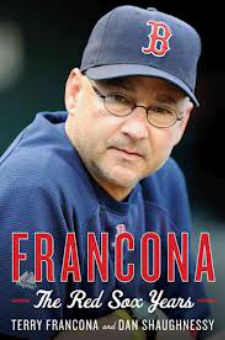There are some famous exceptions: Nick Hornby’s Fever Pitch and Rick Gekoski’s Staying Up, a fan’s record of unprecedented access to a Premiership football team (in which I have a small role). There are also the writings of CLR James about cricket, Beyond a Boundary being the most heralded, Mailer’s epic piece about the epic rumble in the jungle, The Fight, Mark Marqusee’s Anyone but England, A Year with Verona by Tim Parkes and The Damned United by David Peace.
Francona: The Red Sox Years is not in the same league, which will come as no surprise to Alan Siegel, who has recently penned an attack on “The Lodge” of Boston baseball writers, entitled The Fellowship of the Miserable. Dan Shaughnessy, of course, is a – perhaps the - leading member of The Lodge, and it is passing strange that he has got on so well with Francona and Epstein; less strange that Lucchino and Werner emerge with so little credit.
Siegel’s attack on Boston baseball journalism was prompted by the fact that “The Lodge” failed to identify and publish the now infamous beer and chicken stories which marked the final days of Francona’s Red Sox Years. There is nothing here to add to what was published at the time, except, perhaps, a little context in the form of the Jack Daniels ritual of the 2004 World Series winning idiots. Compared to that, what happened in 2011 seems like small beer. The difference is that one team won, the other lost.
But then what this book shows is that Francona was an old-style, traditional baseball guy. Baseball and baseball people are pretty much all he knows. And the baseball he knows is about chewing tobacco, shots of Jack, mooning his coaches, swallowing pain killers when his legs swelled up, maintaining a sense of humour in the face of Manny being Manny, Pedro being Pedro, and Larry Lucchino being Larry Lucchino: in short, moulding crazy individuals into a unit that could win ballgames.
He learned how to do this in a lifetime of baseball, as the young kid accompanying his father Tito, as a player, as an unsuccessful and even more unpopular manager with the Phillies.
In fact, for me, the most interesting sections of the book are those devoted to the years before the Sox. And this is where I acknowledge Shaughnessy’s work in teasing out of a naturally shy and retiring man these stories of a baseball life.
If there is bitterness here, and there is, it is because he loved the game for itself. If there is implicit and explicit criticism of the ownership, and there is, it is because he focused on the baseball not the marketing figures. When the latter took precedence, his work became impossible and it was time to move on. As fans, we understand and respect this.
When he next returns to Fenway as manager (never coach) of the Cleveland Indians, he will receive another standing ovation.
We owe him. Boy, do we owe him.
Today's listening: Dylan, Earl's Court in 1978. The Alimony Tour. An audience tape which captures the way in which Bob and his band transformed a huge shed into an intimate arena. One of my favourite shows.






 RSS Feed
RSS Feed